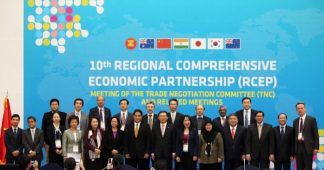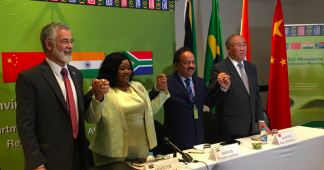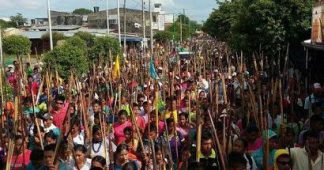By Victoria Tauli-Corpuz
9 August 2018
Victoria Tauli-Corpuz, UN Special Rapporteur on the Rights of Indigenous Peoples and Member of the South Centre’s Board, made a presentation, reproduced below, about ‘The Imperative of Protecting and Respecting Indigenous Peoples’ Rights to Their Traditional Knowledge, Traditional Cultural Expressions and Genetic Resources in the Intellectual Property Rights Regime under the WTO and WIPO’ at the International Conference on the TRIPS-CBD Linkage: Issues and Way Forward, held at the Palais des Nations, Geneva on 7-8 June 2018. The conference was jointly organized by the South Centre, the Centre for WTO Studies, New Delhi and the Indian Institute of Foreign Trade, and co-sponsored by the Permanent Missions of Brazil, India, Indonesia and South Africa to the WTO.
Victoria Tauli-Corpuz, rapporteuse spéciale des Nations Unies sur les droits des populations autochtones et membre du Comité du Centre Sud, a fait un exposé (reproduit ci-dessous) intitulé “L’impératif de protéger et de respecter les droits des peuples autochtones à leurs connaissances traditionnelles, leurs expressions culturelles traditionnelles et leurs ressources génétiques dans le régime des droits de propriété intellectuelle à l’OMC et à l’OMPI” à l’occasion de la conférence internationale sur la relation entre l’Accord sur les ADPIC et la Convention des Nations Unies sur la diversité biologique, qui s’est tenue au Palais des Nations, à Genève, les 7 et 8 juin 2018. La conférence fut organisée par le Centre Sud en collaboration avec le Centre d’étude sur l’OMC de New Delhi et l’Indian Institute for Foreign Trade, et coparrainée par les missions permanentes du Brésil, de l’Inde, de l’Indonésie et de l’Afrique du Sud auprès de l’OMC.
Victoria Tauli-Corpuz, relatora especial de las Naciones Unidas sobre los derechos de los pueblos indígenas y miembro de la Junta del Centro del Sur, hizo una presentación (presentada a continuación) titulada “El imperativo de proteger y respetar los derechos de los pueblos indígenas a sus conocimientos tradicionales, sus expresiones culturales tradicionales y sus recursos genéticos en el régimen de derechos de propiedad intelectual en la OMC y la OMPI”, durante la conferencia internacional sobre la relación entre el Acuerdo sobre los ADPIC y el Convenio sobre la Diversidad Biológica, que se celebró en el Palais des Nations, en Ginebra, los 7 y 8 de junio de 2018. La conferencia fue organizada por el Centro del Sur en colaboración con el Centro de Estudios sobre la OMC, New Delhi, y el Indian Institute for Foreign Trade, y fue copratrocinada por las misiones permanentes de Brasil, de la India, de Indonesia et de Sudáfrica ante la OMC y la OMPI.
Thank you very much to the Centre for WTO Studies, Indian Institute of Foreign Trade and the South Centre for inviting me to present in this International Conference on TRIPS-CBD Linkages. I am pleased to join you here today and share my thoughts on the international legal framework on the protection of indigenous peoples’ traditional knowledge and traditional cultural expressions, focusing on the linkage between the TRIPS and the CBD. We will look into the current state of play with respect to biopiracy and misappropriation of indigenous peoples’ genetic resources, TK and TCEs. Finally, I will identify some of the issues, as well as recommend ways forward.
International standards have come a long way in recognizing the rights of indigenous peoples to their traditional knowledge, traditional cultural expressions and, indeed, even genetic resources. The adoption of the Convention on Biological Diversity (CBD) in 1992 finally did away with the concept of biological and genetic resources as the common heritage of mankind, recognizing that States have sovereignty over biological and genetic resources that are owned, found and accessed from within their territories.
The CBD also conclusively recognizes the authority of indigenous peoples over their traditional knowledge. Specifically, Article 8(j) of the CBD directs Parties to enact national legislation to preserve, protect, maintain, and promote the wider application of indigenous peoples’ traditional knowledge relevant to the conservation and sustainable use of biodiversity, provided that such use takes place with the approval and involvement of the holders of such knowledge. Article 8(j) also encourages equitable sharing of benefits arising from the utilization of such knowledge, innovations and practices.
Indigenous peoples’ right to authorize the use of their genetic resources and traditional knowledge through free, prior and informed consent (FPIC) is further recognized in the policies of UN agencies, such as UNDP, IFAD, FAO, UN-REDD, as well as in the safeguard policies of multilateral development banks, such as the Asian Development Bank, the World Bank, the Inter-American Development Bank, the European Investment Bank and, most recently, the Green Climate Fund. Jurisprudence which affirms the rights of indigenous peoples over their genetic resources and associated traditional knowledge has emerged from Regional Human Rights Courts and UN Treaty Bodies. The latest drafts of the instruments being drafted by the WIPO IGC contain the concept of FPIC of indigenous peoples in relation to the use of their GRs, TK and TCEs. I really do hope that the WIPO IGC will be able to conclude its work soon, and adopt effective protections for the rights of indigenous peoples.
Indigenous peoples have consistently been involved in the work of the CBD, through the International Indigenous Forum on Biodiversity (IIFB), focusing on the Working Group on Article 8(j) and the negotiations leading to the adoption of the Nagoya Protocol. The IIFB had worked long and hard alongside the government delegates to craft the Nagoya Protocol, bringing to the table evidence-based proposals for how the ABS system should respect the rights of indigenous peoples.
As a result of this hard work, and with the 2007 adoption by the General Assembly of the UN Declaration on the Rights of Indigenous Peoples (UNDRIP), which guided the process, the 2010 Nagoya Protocol confirmed that prior informed consent of indigenous peoples is necessary before access to their traditional knowledge associated with genetic resources can take place. The Nagoya Protocol improves on the CBD, recognizing that where there is an established right to grant access to genetic resources, States are required to take measures to ensure that prior informed consent of indigenous peoples is obtained before access to such genetic resources.
Indeed, the UN Declaration on the Rights of Indigenous Peoples, specifically Article 31[1] and related articles, establishes the right of indigenous peoples to grant access to their traditional knowledge and genetic resources subject to their free, prior and informed consent. This right is further established and confirmed in many national laws, including in my country, the Philippines, which probably has the most elaborated law and rules on obtaining free, prior and informed consent for bio-prospecting and other activities that seek to use the GRs and TK of indigenous peoples as well as access and benefit sharing (Wildlife Resources Act).
Aside from the adoption of the Nagoya Protocol and the UNDRIP there have been several important developments in the field of traditional knowledge of indigenous peoples. These developments should be taken into account in the processes around the Agreement on Trade-Related Aspects of Intellectual Property Rights (TRIPS), particularly in the elaboration of the 2001 mandate to work on the relationship between the TRIPS and the CBD. These include the establishment of the Intergovernmental Science-Policy Platform on Biodiversity and Ecosystem Services (IPBES) and the establishment of the Local Communities and Indigenous Peoples Platform (LCIP) of the UN Framework Convention on Climate Change (UNFCCC).
The IPBES was established in 2012 and it is envisioned to “be a leading global body providing scientifically sound and relevant information to support more informed decisions on how biodiversity and ecosystem services are conserved and used around the world”. One of its operating principles is to “Recognize and respect the contribution of indigenous and local knowledge to the conservation and sustainable use of biodiversity and ecosystems.”[2]
In the climate change arena, the Fifth Assessment Report (AR5, 2014) of the Intergovernmental Panel on Climate Change (IPCC) concluded that “indigenous, local and traditional knowledge systems and practices, including indigenous peoples’ holistic view of community and environment, are a major resource for adapting to climate change”. As a result of this, the 21st Session of the Conference of Parties (COP 2015) of the UNFCCC, which adopted the Paris Agreement, included Paragraph 136 which “Recognizes the need to strengthen knowledge, technologies, practices and efforts of local communities and Indigenous Peoples related to addressing and responding to climate change, and establishes a platform for the exchange of experiences and sharing of best practices on mitigation and adaptation in a holistic and integrated manner.[3] The operationalization of the Local Communities and Indigenous Peoples’ Platform was considered at COP 23 last year. Traditional knowledge associated with genetic resources needed for adaptation and mitigation is one aspect of this platform. Decisions related to the disclosure of information on the origins of genetic resources and associated knowledge will be relevant for these bodies.
Going back to the Nagoya Protocol it is important to note that in order to implement the requirements of PIC and MAT (Mutually Agreed Terms), the Protocol recognizes the possibility of designating more than one National Competent Authority, including an indigenous competent authority or authorities, which would be responsible for granting access or providing written evidence that access requirements have been met, and advising on applicable procedures and requirements for obtaining prior informed consent and entering into mutually agreed terms. State Parties are therefore expected to designate indigenous competent authorities in order to enhance legal certainty in relation to PIC, MAT and access rules for GR, TK and TCEs of indigenous peoples.
For indigenous peoples, access rules and requirements for PIC and MAT are contained in their customary laws. Since these customary laws are usually oral in nature, usually narrated in the indigenous language, and are not widely publicized or known, the possibility of developing community protocols was included in the Nagoya Protocol. These community protocols would contain access rules, as well as rules for entering into mutually agreed terms and benefit-sharing, and would be documented and developed by indigenous peoples themselves or with the assistance of technical experts. The Nagoya Protocol requires the support of the State Party in documenting and developing these community protocols, which should be included in the State’s awareness raising programs.
I am pleased to note that many States have reported including this “dual PIC” system in their national laws, requiring both the consent of the State and the consent of indigenous peoples in cases of access to genetic resources and TK of indigenous peoples.[4] I encourage State Parties to the Nagoya Protocol to designate one or more indigenous competent authorities, as well as checkpoints that would ensure compliance with PIC and MAT before granting access to genetic resources and TK of indigenous peoples. In my country, the Intellectual Property Office and the National Commission on Indigenous Peoples have taken on the role to ensure that requirements of PIC and benefit-sharing are met before any intellectual property right that uses indigenous peoples’ genetic resources and TK can be granted or registered.
Yesterday, plenty of information was shared on cases of biopiracy and misappropriation of genetic resources in Africa, South America and Asia: Stevia, Hoodia, Maca, Ayahuasca, Neem, Rooibos, among others. I will not belabor this further, except to say that many of the GRs and associated TK in these cases are held or owned by indigenous peoples. In my country, we have the case of ilosone, the conus toxin, and the collection of blood samples of indigenous peoples by a Swedish University, all of which have not complied with the requirement of FPIC and benefit-sharing. While the WIPO IGC, the TRIPS and the Nagoya Protocol prolong their negotiations, review processes and designation of checkpoints, cases of misappropriation and biopiracy will continue to multiply.
A mandatory disclosure requirement, which is being discussed by WIPO, and which has already been included in many national laws, would help in addressing cases of misappropriation and biopiracy. In order to protect the rights of indigenous peoples, the disclosure required should include information on whether or not indigenous peoples’ genetic resources, TK or TCEs was used, the origin or source, as well as evidence of the free, prior and informed consent of indigenous peoples, mutually agreed terms with them and benefit-sharing.
What would be the consequence of non-compliance? In order to truly have a deterrent effect, non-compliance with FPIC, benefit-sharing and the mandatory disclosure requirement should affect either the validity or ownership of the patent and carry with it punitive sanctions. There should also be the possibility of pre-grant opposition to patents, since the costs of post-grant opposition would be extremely prohibitive and inaccessible for indigenous peoples. The information shared yesterday was upwards of $700 an hour for a patent lawyer to assist in opposing a patent.
The resumption of the work of the WTO on TRIPS-CBD linkage is long overdue and urgently needed in order to prevent further violations of indigenous peoples’ rights to their GR, TK and TCEs. While the TRIPS process and the WIPO negotiations remain in limbo, I find interesting the idea for a plurilateral framework to address misappropriation of indigenous peoples’ GR, TK and TCEs by establishing an international rule detailing the obligation to disclose and the consequences of non-compliance. It is important for this plurilateral framework to explicitly recognize the rights of indigenous peoples to their GR, TK and TCEs, the “dual PIC” requirement in the Nagoya Protocol, the designation of indigenous competent authorities, and the role of community protocols within the compliance regime of the framework. It is only when these rights are recognized and protected that we can have a truly just system for indigenous peoples.
On my part as the Special Rapporteur on the Rights of Indigenous Peoples, I could explore the possibility of developing a thematic study on mandatory disclosure and the rights of indigenous peoples’ to their GR, TK, TCEs, as well as PIC and MAT. This study could contain advice and recommendations for the UN System and Member States.
1. Indigenous peoples have the right to maintain, control, protect and develop their cultural heritage, traditional knowledge and traditional cultural expressions, as well as the manifestations of their sciences, technologies and cultures, including human and genetic resources, seeds, medicines, knowledge of the properties of fauna and flora, oral traditions, literatures, designs, sports and traditional games and visual and performing arts. They also have the right to maintain, control, protect and develop their intellectual property over such cultural heritage, traditional knowledge, and traditional cultural expressions.
2. In conjunction with indigenous peoples, States shall take effective measures to recognize and protect the exercise of these rights.
Author: Victoria Tauli-Corpuz is the UN Special Rapporteur on the Rights of Indigenous Peoples and a Member of the South Centre Board.
Contact details:
Email: indigenous@ohchr.org, or unsr@vtaulicorpuz.org
Website: www.unsr.vtaulicorpuz.org











